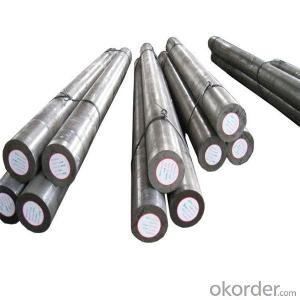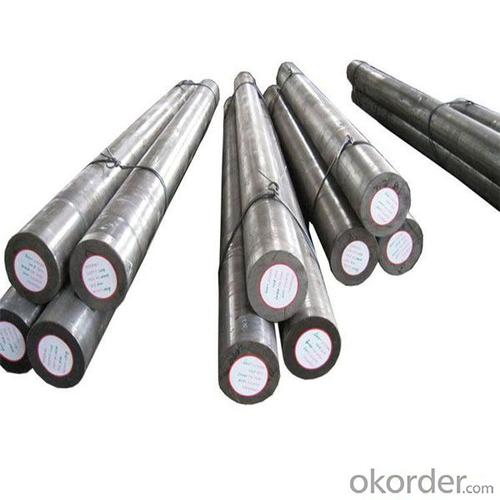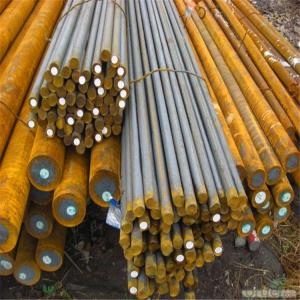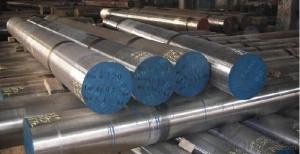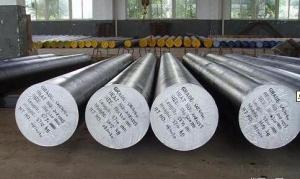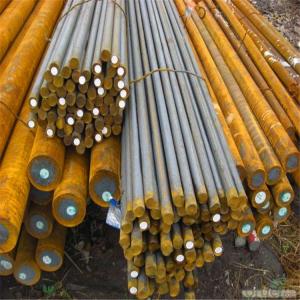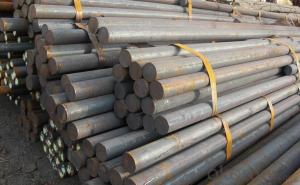Steel Round Bar 18CrNiMo7-6 17CrNiMo6
- Loading Port:
- China main port
- Payment Terms:
- TT OR LC
- Min Order Qty:
- 30 m.t.
- Supply Capability:
- 10000 m.t./month
OKorder Service Pledge
OKorder Financial Service
You Might Also Like
Specification
Steel Round Bar 18CrNiMo7-6 17CrNiMo6
Product Information:
1. Dia.5-50 mm cold drawn,
Dia.12-330 mm hot rolled,
Dia.100-1200 mm forged
2.EAF + LF + VD + Hot rolled or Forged + Annealed / QT (optional)
3.Black / peeled / rough-turned
4.UT SEP1921 Class C/c
5.Application:Heavy-duty arbors, bushings, wear pins, bearings, sprockets, gears and shafts etc. Or can be used for high tensile applications uncarburised but through hardened and tempered.
Good through hardening properties with excellent toughness due to the low carbon and high alloy content, also suitable for Nitriding.
Product Overviews:
| Product Name | Typical Grades | Diameter(mm) | Standard adopted |
| Carbon Steel | 20 (1020/S20C/C22) | Ø16-Ø300 | GB/SAE/JIS/DIN |
| 40 (1040/S40C/C40) | |||
| 45 (1045/S45C/C45) | |||
| Bearing Steel | GCr9 (51100/SUJ1) | Ø12-Ø250 | |
| GCr15 (52100/SUJ2/100Gr6) | |||
| GCr9SiMn (A485-Gr.1/SUJ3) | |||
| Cr-Mo Steel | 20Cr (5120/SCr420H/20Cr4) | Ø12-Ø250 | |
| 40Cr (5140/SCr440/41Cr4) | |||
| 42CrMo(4140/SCM440/42CrMo4) | |||
| Gear Steel | 20CrNiMo | Ø16-Ø600 | |
| 20CrMn(5115/SMnC420/20MnCr5) | |||
| 20CrNiMo(8620/SNCM220/20CrMiMo2) |
Product Show:

Our Advantages:
· Industry experience over 20 years.
· Shipment of goods -More than 70 countries worldwide.
· The most convenient transport and prompt delivery.
· Competitive price with best service.
· High technical production line with top quality products.
· High reputation based on best quality products.
With our experienced, enthusiastic and dynamic staffs, we assure to bring you the products with best quality, reasonable prices and good after-sales services under the motto: Friends First, Business After.
Communication, Experience, Expertise and Best efforts are our Promises to you.
- Q: How can I determine the cooling water flow of square billet mold for special steel?
- Determine the cooling water flow rate according to the cooling water flow rate. The cooling water amount of mould W can be calculated according to the following formula: W=0.0036FV, W - cooling water of mould, m3/h;F - total area of mold water gap, mm2;V - the velocity of cooling water in the water seam, m/s, for the billet mold, the flow speed should be greater than 6m/s, generally take 6~9m/s.
- Q: How is special steel manufactured?
- Special steel is manufactured through a process called steelmaking, which involves combining iron with various alloying elements such as chromium, nickel, and molybdenum. This mixture is then heated and processed in electric arc furnaces or basic oxygen furnaces to remove impurities and adjust the chemical composition. The molten steel is further refined and cast into desired shapes or forms, followed by additional heat treatment processes like quenching and tempering to enhance its strength and special properties.
- Q: What are the different types of heat treatment processes used for special steel?
- The different types of heat treatment processes used for special steel include annealing, normalizing, hardening, tempering, and quenching.
- Q: What are the varieties of special steel
- The alloy steel and high alloy steel special steel production accounted for 70%, mainly for special steel carbon structural steel, carbon tool steel, carbon spring steel, alloy spring steel, alloy structural steel, bearing steel, alloy tool steel, alloy tool steel, high-speed tool steel, stainless steel, heat-resistant steel and high-temperature alloy, precision electrothermal alloy alloy, etc..
- Q: How does special steel contribute to the safety of infrastructure?
- Special steel plays a crucial role in enhancing the safety of infrastructure in various ways. Firstly, it offers exceptional strength and durability, allowing for the construction of robust and resilient structures. Whether it is used in bridges, buildings, or tunnels, special steel provides the necessary structural integrity to withstand extreme loads, such as heavy traffic, strong winds, seismic activities, or even potential terrorist attacks. Moreover, special steel possesses excellent corrosion resistance properties, making it suitable for infrastructure projects exposed to harsh environmental conditions. By preventing rust and decay, it extends the lifespan of structures and reduces the need for costly maintenance and repairs. This is especially important in coastal areas, where infrastructure is subjected to the corrosive effects of saltwater. In addition to its strength and corrosion resistance, special steel also offers exceptional fire resistance. It has a high melting point, which allows it to maintain its structural integrity under extreme temperatures. This characteristic is critical for infrastructure safety, as it provides additional time for evacuation and emergency response in case of a fire. Furthermore, special steel can contribute to the safety of infrastructure by enabling innovative design solutions. Its versatility allows for the creation of complex and efficient structures, such as long-span bridges or skyscrapers. These designs often incorporate special steel components, such as high-strength beams or columns, which enhance the overall stability and safety of the infrastructure. Overall, special steel's exceptional strength, corrosion resistance, fire resistance, and design flexibility make it an essential material for ensuring the safety and reliability of infrastructure. By utilizing special steel in construction projects, engineers and architects can create structures that can withstand various challenges, ultimately protecting the lives and well-being of the people who utilize them.
- Q: What are the requirements for special steel used in transportation equipment manufacturing?
- The requirements for special steel used in transportation equipment manufacturing typically include high strength and durability, excellent corrosion resistance, good weldability and formability, as well as the ability to withstand extreme temperatures and mechanical stress. Additionally, the steel should possess specific properties such as low weight, high impact resistance, and resistance to fatigue and wear. Compliance with industry standards and regulations is also crucial to ensure the safety and reliability of transportation equipment.
- Q: How does special steel contribute to the automotive sector?
- Special steel plays a significant role in the automotive sector by contributing to the manufacturing and performance of various automotive components. It offers several benefits that enhance the overall quality, durability, and safety of vehicles. Firstly, special steel is known for its exceptional strength and toughness. This makes it ideal for producing critical automotive parts such as engine components, chassis, suspension systems, and safety reinforcements. These components require high strength to withstand the stresses and strains experienced during vehicle operation, ensuring the safety of passengers. Furthermore, special steel provides excellent resistance to wear, corrosion, and high-temperature environments. This makes it suitable for manufacturing parts like gears, bearings, shafts, and exhaust systems, which are exposed to harsh conditions. The use of special steel in these components improves their lifespan, reliability, and overall performance, reducing maintenance and replacement costs for vehicle owners. Moreover, special steel enables the lightweighting of vehicles. Automakers are constantly striving to reduce the weight of vehicles to enhance fuel efficiency and reduce emissions. Special steel alloys, such as high-strength low-alloy (HSLA) steel, offer a unique combination of strength and lightweight properties, allowing manufacturers to design lighter and more fuel-efficient vehicles without compromising on safety or performance. In addition to its mechanical properties, special steel also contributes to the automotive sector through its versatility in manufacturing processes. It can be easily formed, welded, and machined, enabling complex shapes and designs for automotive parts. This flexibility enhances the design possibilities and allows for innovative solutions to meet the evolving needs of the automotive industry. Overall, special steel plays a crucial role in the automotive sector by providing strength, durability, and lightweight properties to various components. Its use in critical parts ensures the safety of vehicles and passengers, while its resistance to wear and corrosion improves the longevity and performance of automotive systems. With the constant drive for fuel efficiency and innovation in the automotive industry, special steel continues to be an essential material in shaping the future of automobiles.
- Q: What are the main advantages of using special steel in the automotive racing industry?
- The main advantages of using special steel in the automotive racing industry are its high strength-to-weight ratio, excellent durability, and superior heat resistance. Special steel allows for the construction of lightweight yet strong components, enhancing the overall performance and speed of racing cars. Additionally, its exceptional durability ensures that the parts can withstand the extreme forces and vibrations experienced during racing, minimizing the risk of failure. Moreover, special steel's excellent heat resistance prevents deformation or weakening of components, even under high temperatures generated by the intense racing conditions.
- Q: How does special steel contribute to the agriculture aftermarket industry?
- The agriculture aftermarket industry relies heavily on special steel, which plays a vital role in enhancing productivity and efficiency in farming operations through the provision of high-performance components and equipment. Special steel, also known as alloy steel, is specifically engineered to possess properties such as strength, durability, corrosion resistance, and heat resistance, making it well-suited for various agricultural applications. One of the major contributions of special steel to the agriculture aftermarket industry is the manufacturing of machinery parts that are durable and reliable. These parts, including plowshares, blades, and tines, face harsh conditions such as intense wear, impact, and exposure to corrosive substances. However, special steel components can endure these challenges and offer a longer service life, resulting in reduced downtime and maintenance costs for farmers. Moreover, special steel is utilized in the production of agricultural equipment such as tractors, harvesters, and sprayers. These machines require materials that are both strong and lightweight to ensure optimal performance and fuel efficiency. The use of special steel grades provides the necessary strength while keeping the equipment's weight low, enabling farmers to cover larger areas and increase their productivity. Additionally, special steel alloys are employed in the manufacturing of precision tools used in precise farming techniques, such as cutting blades and drill bits. These tools allow farmers to carry out tasks with high accuracy, such as soil sampling, seeding, and crop monitoring. The durability and sharpness of special steel tools enhance the precision and effectiveness of these operations, leading to improved crop yields and efficient use of resources. Furthermore, special steel is also utilized in the construction of infrastructure related to the agriculture aftermarket industry. Steel beams and columns, for example, are used in the fabrication of storage facilities, barns, and grain silos, providing structural strength and stability. This infrastructure enables efficient storage, handling, and transportation of agricultural products, contributing to the overall efficiency of the industry. In conclusion, special steel is an indispensable component of the agriculture aftermarket industry as it contributes to the production of durable machinery parts, lightweight equipment, precision tools, and robust infrastructure. By offering enhanced strength, durability, and corrosion resistance, special steel helps farmers improve productivity, reduce downtime and maintenance costs, and achieve better crop yields.
- Q: What are the different methods for improving the wear resistance of special steel?
- There are several methods that can be employed to enhance the wear resistance of special steel. These methods include: 1. Alloying: By adding specific alloying elements to the steel composition, such as chromium, vanadium, or molybdenum, the wear resistance can be significantly improved. These alloying elements form carbides within the steel matrix, which increase hardness and provide resistance against wear. 2. Heat treatment: Special steels can undergo various heat treatment processes, such as quenching and tempering, to enhance their wear resistance. Quenching involves rapidly cooling the steel from high temperatures to increase hardness, while tempering is performed to relieve internal stresses and improve toughness. 3. Surface coatings: Applying specialized coatings on the surface of the steel can greatly improve wear resistance. Common coating methods include thermal spray coating, electroplating, and physical vapor deposition. These coatings create a protective layer that resists wear and reduces friction. 4. Shot peening: This mechanical surface treatment involves bombarding the steel surface with small spherical particles, called shot, at high velocities. The impact of the shot induces compressive stress on the surface, which enhances the material's resistance to wear and fatigue. 5. Nitriding: This process involves diffusing nitrogen into the surface of the steel at elevated temperatures. Nitrogen forms nitrides, which significantly increase surface hardness and wear resistance. 6. Cryogenic treatment: By subjecting the steel to extremely low temperatures, typically below -100 degrees Celsius (-148 degrees Fahrenheit), the material undergoes a structural transformation that increases its wear resistance. This process helps to refine the grain structure and improve the material's toughness. 7. Grain refinement: By employing methods like severe plastic deformation or specialized casting techniques, the grain size of the steel can be reduced. Smaller grain sizes result in increased hardness and wear resistance due to improved dislocation movement and reduced grain-boundary sliding. It is important to note that the choice of method for improving wear resistance depends on factors such as the specific application, budget, and desired level of improvement. A combination of these methods may also be utilized to achieve optimal wear resistance in special steel.
Send your message to us
Steel Round Bar 18CrNiMo7-6 17CrNiMo6
- Loading Port:
- China main port
- Payment Terms:
- TT OR LC
- Min Order Qty:
- 30 m.t.
- Supply Capability:
- 10000 m.t./month
OKorder Service Pledge
OKorder Financial Service
Similar products
Hot products
Hot Searches
Related keywords
